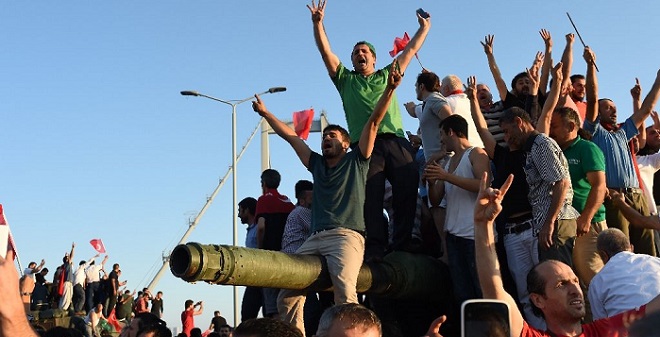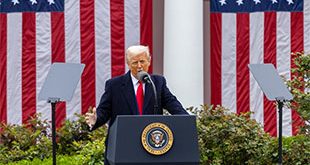
Istanbul, Turkey | AFP |The consequences of the failed July 15 coup in Turkey increased Ankara’s international isolation, exposing shortcomings in the government’s sometimes overambitious foreign policy, analysts say.
NATO member and EU membership hopeful Turkey had expected an outpouring of solidarity after the coup attempt one year ago aimed at ousting President Recep Tayyip Erdogan, which Ankara blames on the US-based preacher Fethullah Gulen.
But ties with Brussels were bruised and Turkey’s long-running EU membership bid set back as the European Union reacted with alarm to the post-coup purge that has seen tens of thousands arrested.
The US presidency of Donald Trump has so far also given no hope that Turkey has seen the end of the rancour that marked ties between Washington and Ankara under Barack Obama.
Meanwhile, the diplomatic crisis in the Gulf risks wrecking Turkey’s efforts to keep a tight strategic alliance with Qatar without upsetting Saudi Arabia.
“Turkey has been somewhat isolated diplomatically since the July 2016 failed coup, both because NATO partners were taken by surprise and because the subsequent purge went far beyond anything that could be expected,” said Marc Pierini, a visiting scholar at Carnegie Europe.
“The crisis between Saudi Arabia and its allies and Qatar only adds to the host of problems Turkey is facing on the diplomatic front,” he told AFP.
– ‘Ever-increasing disputes’ –
Ankara’s precarious position is a far cry from what it enjoyed a decade ago, when Erdogan was seen as an essential mediator in almost every crisis and was courted by both the European Union and the United States.
For former prime minister Ahmet Davutoglu, Turkey was a centre of the Islamic world and deserved influence from Bosnia to Arabia in lands Constantinople controlled under the Ottoman Empire.
Turkey had high hopes that the Arab Spring uprisings would bring into power Sunni Muslim governments that would be under Turkish influence.
But the ousting of the Muslim Brotherhood’s Egyptian president Mohamed Morsi and failure to unseat Syria’s Bashar al-Assad put paid to these goals.
“The picture today is a very different one,” said Kemal Kirisci of the Brookings Institution.
“It is characterised by the ever-increasing disputes that Turkey is having with countries in its neighbourhood and beyond,” he added.
– ‘Not even partially fulfilled’ –
Turkey has sought to join the European Union for the last half century, in an agonisingly slow process where Ankara has watched on enviously as post-Communist states join the bloc with far less fuss.
Erdogan has sometimes made Brussels seem like a strategic enemy rather than partner, with attacks bubbling with venom in the run-up to an April 16 referendum on enhancing his powers.
Victory in that referendum handed Erdogan powers that critics fear will create one-man rule and take Ankara inexorably away from European values.
“The bases for a deeper political alliance through EU membership remain as they have always been. It will be up to Turkey’s leaders, at some point in the future, to return to their earlier ambitions,” said Pierini, a former EU ambassador to Ankara.
Despite the controversies surrounding Trump’s anti-Muslim rhetoric, Turkish officials fell over themselves to welcome the tycoon as US leader, predicting a new page in relations.
But no progress has materialised on the vexed issue of Turkey’s desire to secure the extradition of Gulen, who denies any link to the coup, or US support for a Kurdish militia in Syria which Ankara sees as terrorists.
A much-touted visit by Erdogan to Washington to iron out these issues was overshadowed by a fracas involving his bodyguards that led to arrest warrants for 12 members of his security detail.
“While Ankara was very optimistic about the Trump presidency, none of Turkey’s expectations from the new US administration were even partially fulfilled,” said Ozgur Unluhisarcikli, director of the Ankara office of the German Marshall Fund of the United States.
– ‘Severe test’ –
In this context, the Saudi-led move to isolate Qatar over its alleged support for terrorism — claims that both Doha and Ankara reject — was the last thing Turkey needed.
Turkey had to some extent repaired ties with Saudi Arabia after a downturn in relations following Riyadh’s support for the ousting of the pro-Ankara Morsi in Egypt.
But it now finds itself dealing with a new environment in the Gulf, especially after the surprise elevation of the hugely powerful Prince Mohammed bin Salman to be Saudi crown prince.
Qatar has over the last years emerged as possibly Turkey’s number one ally, with Ankara even setting up a military base in the emirate and Erdogan building a strong bond with Emir Tamim bin Hamad.
Kirisci said the crisis was “deeply disturbing for Turkey”, with Riyadh snubbing Ankara’s efforts at mediation.
Turkey is increasingly banking on a close relationship with Russia and has made much of a multipolar foreign policy, vastly expanding its diplomatic presence in Africa. But Moscow could prove a rickety crutch on which to rest Turkey’s foreign policy.
“Turkish foreign policy is undergoing a severe test,” said a European diplomatic source. “Things are going better with Russia but this is not a relationship that is founded on confidence.”
 The Independent Uganda: You get the Truth we Pay the Price
The Independent Uganda: You get the Truth we Pay the Price



